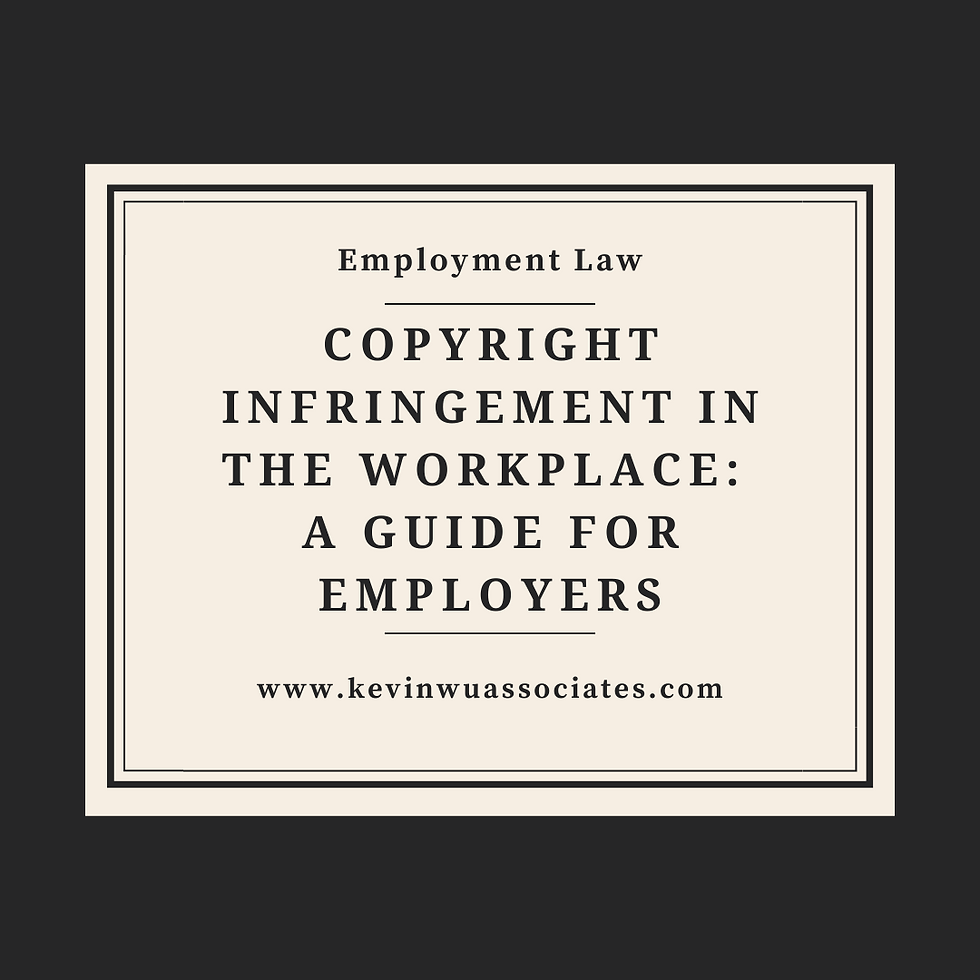COVID-19 - Know your Rights as an Employee during this Pandemic
- Kevin Wu & Associates

- Mar 11, 2021
- 3 min read
Updated: Dec 2, 2022
The COVID-19 pandemic followed by subsequent lockdowns and travel bans have crippled the lives of workers across many sectors. Some companies laid off hundreds – sometimes thousands - of workers via zoom calls in a matter of minutes[1]. Are you worried about losing your job? Here are some frequently asked questions regarding the legal impact of COVID-19 on employment.
Will I get paid if the business falls under non-essential and I do not have to go to work? Yes, according to the Ministry of Human Resources, even where employees are not physically present at work during this pandemic period, employers should still pay the employees’ salaries in full as stipulated in their employment contracts.
Will I get paid if I’m under quarantine?
The employee is entitled to receive full payment of his salary during the quarantine period regardless whether he/she is at home or in the hospital[2].
Can there be a salary cut? No salary cut can be imposed without the employee’s consent. However, in the event where the business is facing cash flow problems and to prevent business closure, the employer can negotiate with employees to agree on a temporary salary cut which can be reinstated later when the business recovers[3].
Can I be forced to take unpaid leave/paid annual leave? No, employers cannot force their employees to take annual leave. However, businesses can propose voluntary unpaid leave and where the employee agrees to such proposal, he/she must provide written consent.
Is there a risk of retrenchment and redundancy?
There is a risk that you will lose your job because you are no longer needed. According to case laws, employers are allowed to undertake measures such as retrenchment in order to reduce business costs and ensure the survival of businesses during such an unprecedented period. Be as that it may, employers are still required to adhere to the Code of Conduct for Industrial Harmony 1975[4] while undertaking such action. In the event of unfair dismissal, you can always bring your case to the Industrial Court.
Can I be disallowed from coming to work?
If you have been quarantined by a certified medical practitioner[5], you may be legally restricted from attending work. However, you are still entitled to paid sick leave[6].
Can I choose to work from home?
Employers are highly encouraged to implement flexible work policies, such as the ‘work-from-home’ (WFM) policy to minimize the risk of transmission at the workplace. However, if the company did not implement WFH policy, the employees must be physically present in the office.
What if my employer does not comply with the MCO regulations?
In the event where your employer does not adhere to the SOPs imposed by the government, such as no social distancing, no temperature check or basic sanitizers provided, you can always lodge a police report or lodge a report with Rela[7].
In conclusion, it is important to know your rights as an employee during these unprecedented times. It may be confusing and complicated at first glance; hence it is important to obtain legal advice in the event that you are treated unfairly at your workplace.
[1] Sam Shead, “Coronavirus: Start-ups use Zoom app to lay off staff” <https://www.bbc.co.uk/news/technology-52091615> last accessed 23 February 2021 [2] Section 60F Employment Act 1955 [3] Lim Ban Leong v Gold Bridge Engineering & Construction Bhd [2017] 2 LNS 0370 [4] The Code of Conduct for Industrial Harmony 1975 [5] Section 15(1) Prevention and Control of Infectious Diseases Act 1988 [6] Section 60F Employment Act 1955 [7] Section 3 of the Prevention and Control of Infectious Diseases Act 1988 (Act 342).
Authored by Tiffany Ding & Wendy Tan
Kindly note that this legal article does not, and is not intended to, constitute formal legal advice by the Firm, instead all information, content and materials available on this site are for general informational purposes only. If readers require further clarification or legal advice, please email office@kevinwuassociates.com.



